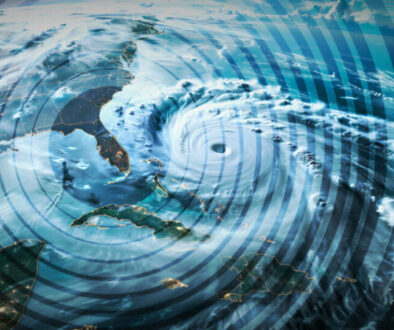Yellen warns of insurance ‘protection gap’ due to climate disasters
In a meeting of the Financial Stability Oversight Council last week, its chairwoman, Treasury Sec. Janet Yellen, warned of a “protection gap” for Americans trying to buy insurance against property losses from climate-related disasters, and said just 60% of the $165 billion in economic losses from extreme weather were covered by insurance last year.
“American households are already seeing the impacts even if their own homes have not been damaged,” Yellen said at the Washington D.C. meeting. “As a result, more households are turning to residual markets for coverage or are foregoing insurance entirely.”
The meeting was to tout the release of the council’s update report on climate-related financial risk, which said it has made progress in advancing recommendations made in an earlier Climate Report in addressing capacity building, disclosure, data, and assessment and mitigation of risks.
The council is charged by statute with identifying risks to the country’s financial stability as well as promoting market discipline and responding to emerging threats to the country’s financial system.
But clearly a top concern of the council is what it called “gaps” in the supervision and regulation of insurers and the potential for major disruptions of private insurance coverage in areas of the country particularly vulnerable to climate change impacts.
‘Climate-related risks’ cited in report
“All state insurance regulators should prioritize efforts to adapt their regulatory and
supervisory tools to incorporate climate-related risks,” a June report from the Treasury’s Federal Insurance Office said. “The National Association of Insurance Commissioners and state insurance regulators should also prioritize the creation of new and effective climate-related risk tools and processes for use by state insurance regulators.”
Government officials are particularly worried about the recent insurance company withdrawals from areas of the country prone to weather-related catastrophes, like Florida, California, and Louisiana.
“In addition to challenges to households, we must also better understand the implications of changes in property insurance for real estate markets and financial institutions that rely on insurers to help manage risks,” Yellen said.
Florida, Calif. hit by crisis
Florida’s state-run property insurer warned recently that Hurricane Ian had “significantly depleted” its reserves and that it might impose a surcharge on millions of policyholders in the state if another major hurricane generates massive claims.
California’s state-run FAIR plan reported a $332 million deficit and maintains low premiums has limited the ability to insure for catastrophic wildfire claims.
Farmer’s Insurance pulled out of some home policies in Florida, affecting 100,000 policyholders. And State Farm and Allstate said it would withdraw from California markets citing the high risks, and costs, of devastating climate disasters.
“Recent insurer withdrawals represent a devastating indication of the national scale of the climate-driven insurance crisis,” said Carly Fabian, insurance policy advocate at Public Citizen, which along with other progressive groups called on the FSOC to consider financial risks by insurance companies due to climate change. “As insurers face higher losses and pass the costs to consumers across the country by raising premiums and withdrawing coverage, regulators must recognize that climate-related risk is financial risk and Americans are already paying the price.”
Fabian said the U.S. Treasury Department must monitor disruptions in insurance access and the potential for “systemic risks to the economy…”
Yellen seeks review of climate disaster risks
Yellen, in her remarks, said she welcomed a further review of the risks posed by the interconnectedness of real estate insurance and the broader financial system. She noted the U.S. has experienced a total of $360 billion disaster events since 1980 averaging around eight of these disasters a year. In the last three years alone, there have been a total of 60 of these events, an average of 20 a year, or 2.5 times greater than the long-term average.
“The physical impacts of climate change continue to worsen,” she said. “In the past month, average global temperatures have set new records for the hottest temperatures in recorded history and millions of Americans have been exposed to record breaking heat and not just wildfire smoke. This summer, climate disasters have grown in frequency and intensity in recent years. “
Yellen’s figures questioned
Yet, insurance groups somewhat questioned Yellen’s figures about uninsured numbers.
Across the country, insurers paid a record $275 billion in natural catastrophes losses over the last three years, the highest ever three-year total for U.S. insurers, according to AON,” said Nat Wienecke, senior vice president of federal government relations for the American Property Casualty Insurance Association. “Additionally, according to AON, insured natural catastrophe losses in the first half of the year reached $40 billion in the U.S., the third costliest year on record for this period.”
Wienecke said the challenges facing insurance markets go well beyond just the increasing natural catastrophes from climate change including the increasing exposure values as people live and work in more expensive homes and buildings in hazard-prone areas, such as coastal and wildfire-prone regions.
Additionally, unchecked legal system abuse and worsening regulatory mandates are also making it increasingly difficult for insurers to prudently manage risk,” he said. “As the world’s risk managers, insurers are proactively engaged in efforts to address long-term weather-related losses by advocating for strong land use policies, building codes, and critical infrastructure to increase the resilience of our homes and communities. Insurers are in a unique position to help policyholders, businesses, and governments understand and mitigate the risks they face.”
Yellen called for increased cooperation among state and federal agencies to monitor and manage the increased climate-related threats.
“These threats do not adhere to regulatory boundaries, they travel from one regulated space to another,” she said. “Therefore, the stability of the financial system is best promoted when regulators work together. Key to this collaboration is the ability to not only access data but the tools to integrate and analyze it and ultimately produce interdisciplinary research that pinpoints where risks are and where they may go.”
Doug Bailey is a journalist and freelance writer who lives outside of Boston. He can be reached at doug.bailey@innfeedback.com.
© Entire contents copyright 2023 by InsuranceNewsNet.com Inc. All rights reserved. No part of this article may be reprinted without the expressed written consent from InsuranceNewsNet.com.
The post Yellen warns of insurance ‘protection gap’ due to climate disasters appeared first on Insurance News | InsuranceNewsNet.



